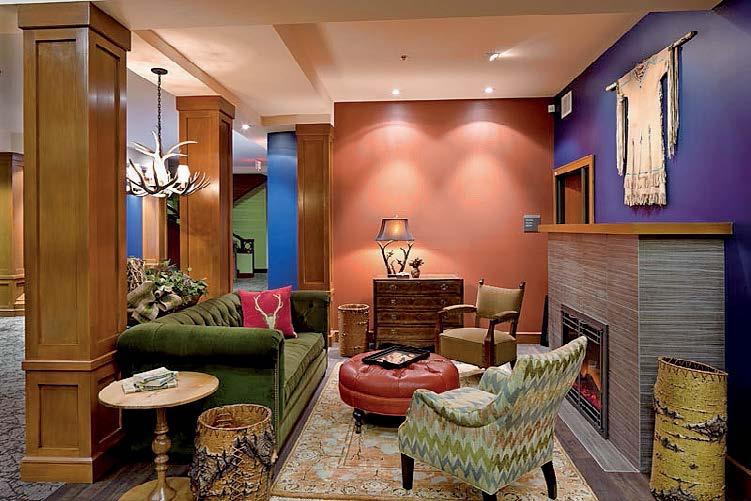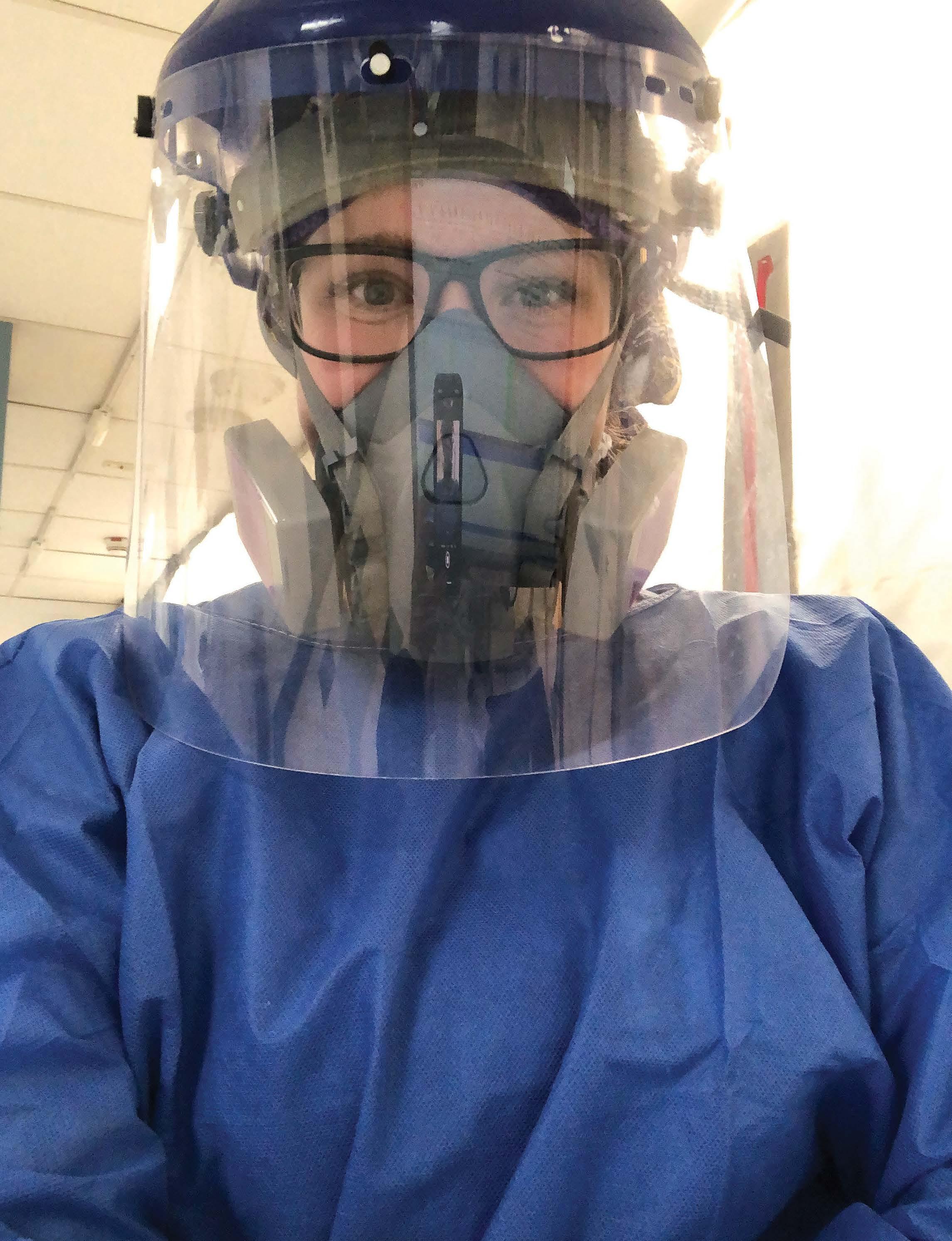
5 minute read
Jazdzewski
Jazdzewski, a nurse, needed a bit of a break. Her schedule of 13-hour days working in the COVID-19specific Intensive Care Unit at SUNY Downstate Health Sciences University, a hospital in Brooklyn, New York, has been grueling.
As she neared the end of her two-month commitment at SUNY and prepared to return to her hometown of Duluth, Jazdzewski shared what she has learned — about the pandemic, certainly — but she also openly described the many hard-won life lessons she picked up along the way.
Duluthian – Born and raised Jazdzewski grew up in Duluth’s Woodland neighborhood and graduated from the former Duluth Central High School. An active child, she enjoyed sports, spending time at the family cabin just north of Duluth, and visiting the Lakewalk.
She decided to enter the nursing profession after watching the examples set by her grandmother and her older sister, Amanda.
“My grandma was a volunteer at St. Luke’s, and my sister is a nurse,” she said. “I had an interest in the profession, but I also followed what they were doing.”
Jazdzewski, 27, graduated from the College of St. Scholastica in 2016 with a bachelor’s degree in nursing. She has worked in the St. Luke’s intensive care unit for the last four years.
Personal struggles inspire change
Shortly before life as we know it was transformed with the arrival of COVID-19, Jazdzewski was going through some personal struggles of her own. She went through a tough breakup, and, since her name wasn’t on the title of the house the couple shared, also lost her home.
Her entire life was already ripe with change and uncertainty, so Jazdzewski figured she may as well add another variation to the mix.
“Right around this time, I was hearing what was happening with COVID-19 in New York, and I wanted to be in the middle of everything. I’m kind of an adrenaline junkie,” she said. “And at the same time, I wanted to get away from all the drama at home.”
Learning of the need


Requests for medical professionals to relocate to New York City became more intense, as the city is considered one of the epicenters of the pandemic.

“One of the guys I worked with, Brian Assad, who is in the Air Force but also worked at St. Luke’s, was actually deployed to New York to serve as a nurse for COVID,” she said. “And I saw a lot of calls on Facebook looking for nurses to help.”
Jazdzewski signed up with Aya Healthcare, a nursing agency based in San Diego and a placement at SUNY was locked down in very short order. Her boss at St. Luke’s, together with their human resources team, agreed to give Jazdzewski a two-month leave of absence.
Things moved very quickly: everything was orchestrated and solidified within three days.
Out of her comfort zone
While she looked forward to helping with the muchneeded coronavirus efforts, Jazdzewski was apprehensive.
“I had never lived on my own, and never even traveled on my own. This is all out of my comfort zone,” she said.
Additionally, her family did not support her decision to move to New York, because they were worried about her safety. But she knew it was something she had to do.
Jazdzewski moved into an Airbnb about a mile and a half from the hospital. She walked to and from work every day. The vast majority of health care providers currently working at SUNY are travelers, Jazdzewski said, and they come from all over the United States.
“All of the different accents were hard to understand at first,” she said with a laugh.
COVID-specific
SUNY currently has three intensive care units, one of which is dedicated solely to COVID patients. Jazdzewski was assigned to the COVID unit.
Her daily personal protective equipment requirements included a respirator (provided by St. Luke’s), shoe covers, a face shield, goggles and hair cap.
Continued on page 14
“I traveled here with a full suitcase of just PPE,” she said. The conditions of COVID patients in New York were shocking to Jazdzewski.
“I never would have believed it if I hadn’t come out here,” she said. “About 95% of the patients with COVID who were on a ventilator died. No one knew how to treat these patients. Many of them were normal, healthy people until they became infected. Everyone still wears masks out here — people take it very seriously.”
She shared a story of how her efforts directly saved a patient’s life.
“So many people coded. There was not enough time, or staff, to work on people. And many people who would normally have survived passed away.
“We were still in ‘war zone’ mentality,” she continued, “and we’d give three minutes of CPR to each patient who coded and then have to move on to the next. One day a woman coded, and then two others coded a couple doors down, so after that three minutes, the doctor had to move on. This patient still had a pulse, so I said, ‘I’m going to keep working on her.’ And she survived.”
Life lessons
Jazdzewski has learned many valuable lessons through this distressing experience.
“I learned the value of life itself,” she said. “You can be here one day and gone the next. People should make peace with their problems and the people in their lives.
“Also, it’s not about material possessions or ‘stuff,’” she added. “Life is about finding happiness and peace.”
Jazdzewski plans to continue her education and continue helping as many patients as she can. First, she plans to travel to Nigeria in November to volunteer to help with openheart surgeries through the Zoom Foundation.
She is currently taking a college-level biochemistry course, which is a prerequisite for graduate school. Eventually, she also wants to earn her critical care license, and apply to certified registered nurse anesthetist school. Someday she would even like to open a rescue organization for dogs and farm animals.
Homecoming
On June 26, Jazdzewski was scheduled to be heading home. She required two weeks of self-quarantine and a negative COVID test before she can return to work at St. Luke’s. She said she looked forward to reuniting with her three dogs, Kobe, Milo, and Willow, and eventually returning to the activities she loves, such as mountain biking, playing softball and visiting local breweries.

While working on the COVID-19 front line in New York, Duluth nurse Molly Jazdzewski’s daily personal protective equipment included a respirator (provided by St. Luke’s), shoe covers, a face shield, goggles and hair cap, as shown on page 12.
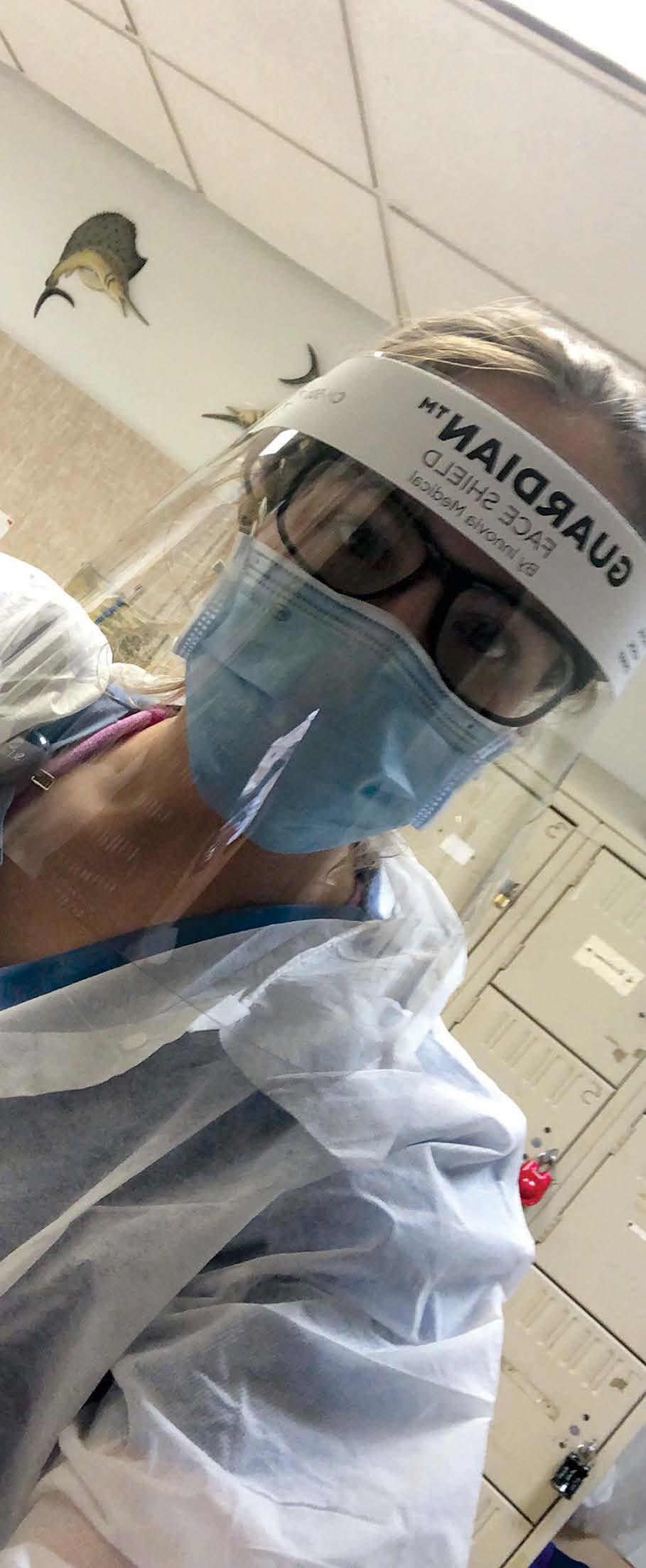
But this medical professional urges us to take it slow.
“I don’t want people to think everything’s just going to go back to normal,” she said. “I get it – we have all been cooped up and want to see our friends and family. But we need to take it slow, and respect the process.”
Jazdzewski recommends continuing to wear masks — a surgical mask or N95 if available, but otherwise, a simple cloth mask will do.
“And, I would still recommend social distancing,” she added. “We’re still doing it in New York.”
Trial by fire
After this harrowing experience, where she has witnessed a few patients live, but many more perish, Jazdzewski reflected on what the experience has taught her about her own strengths.
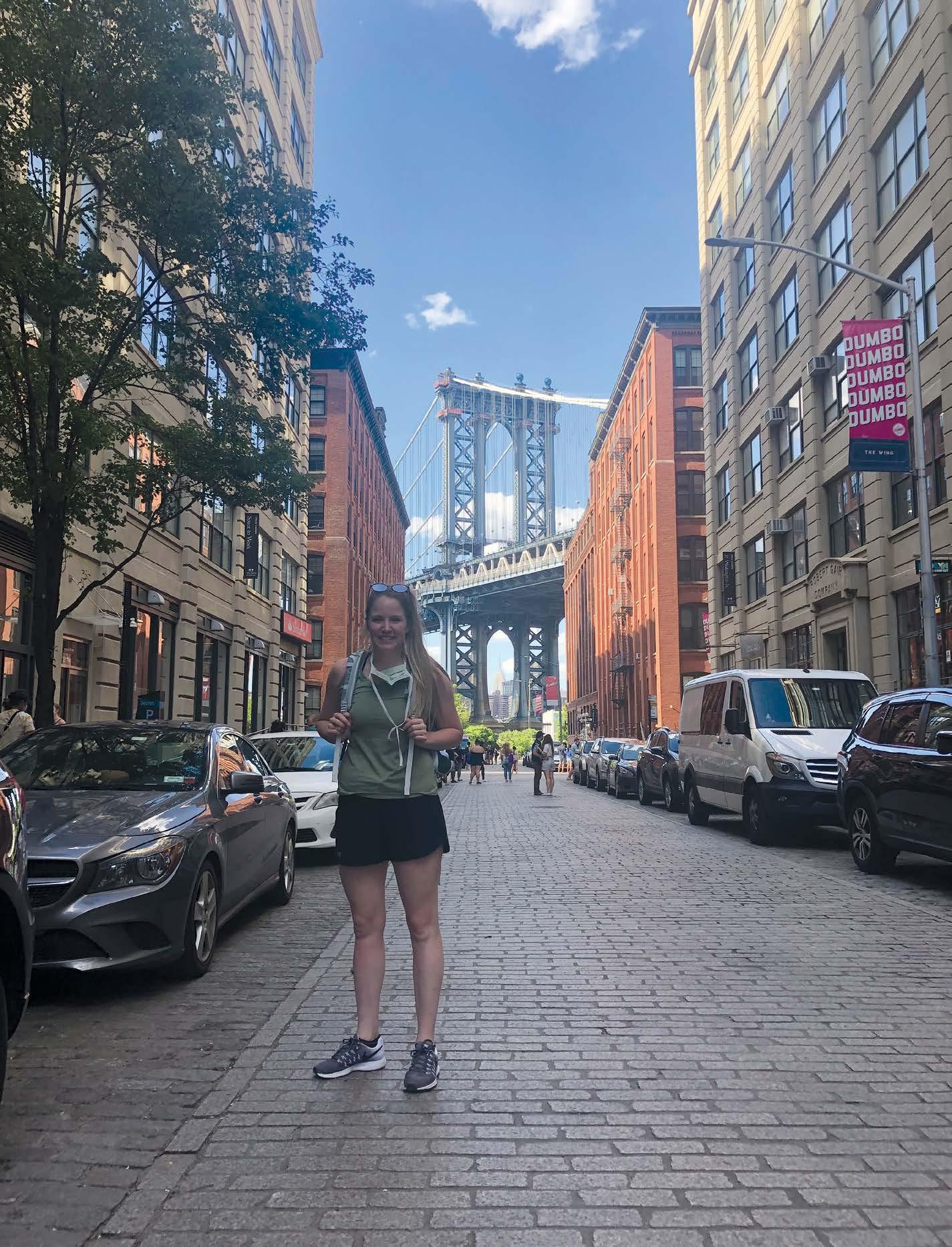
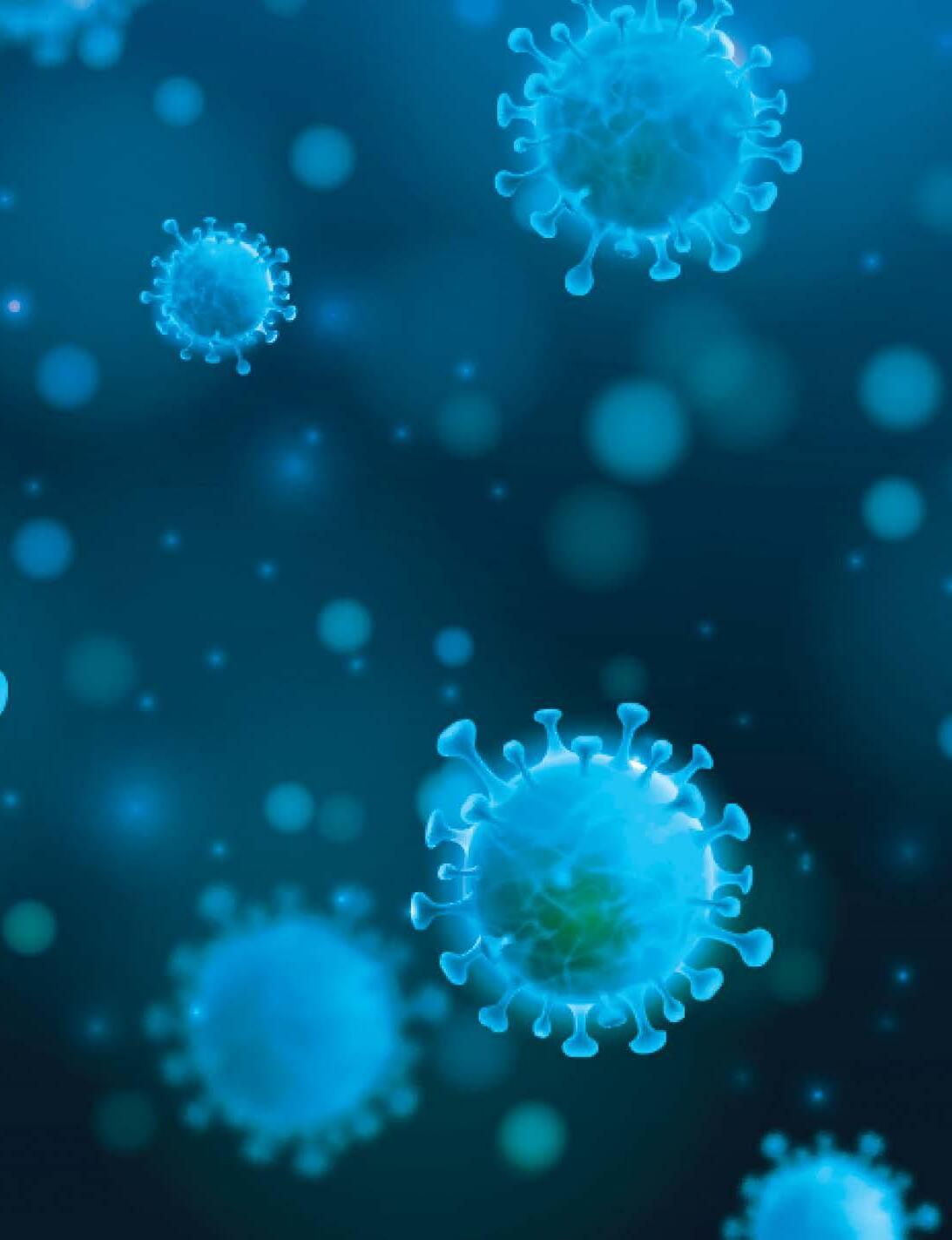
“I have a lot of confidence coming out of this,” she said. “I really believe in myself, and I learned that professionally, I know what I’m doing.” D
Andrea Busche is a Duluth freelance writer.
22nd annual ARTcetera: TREASURING ––––––––––––––––––
